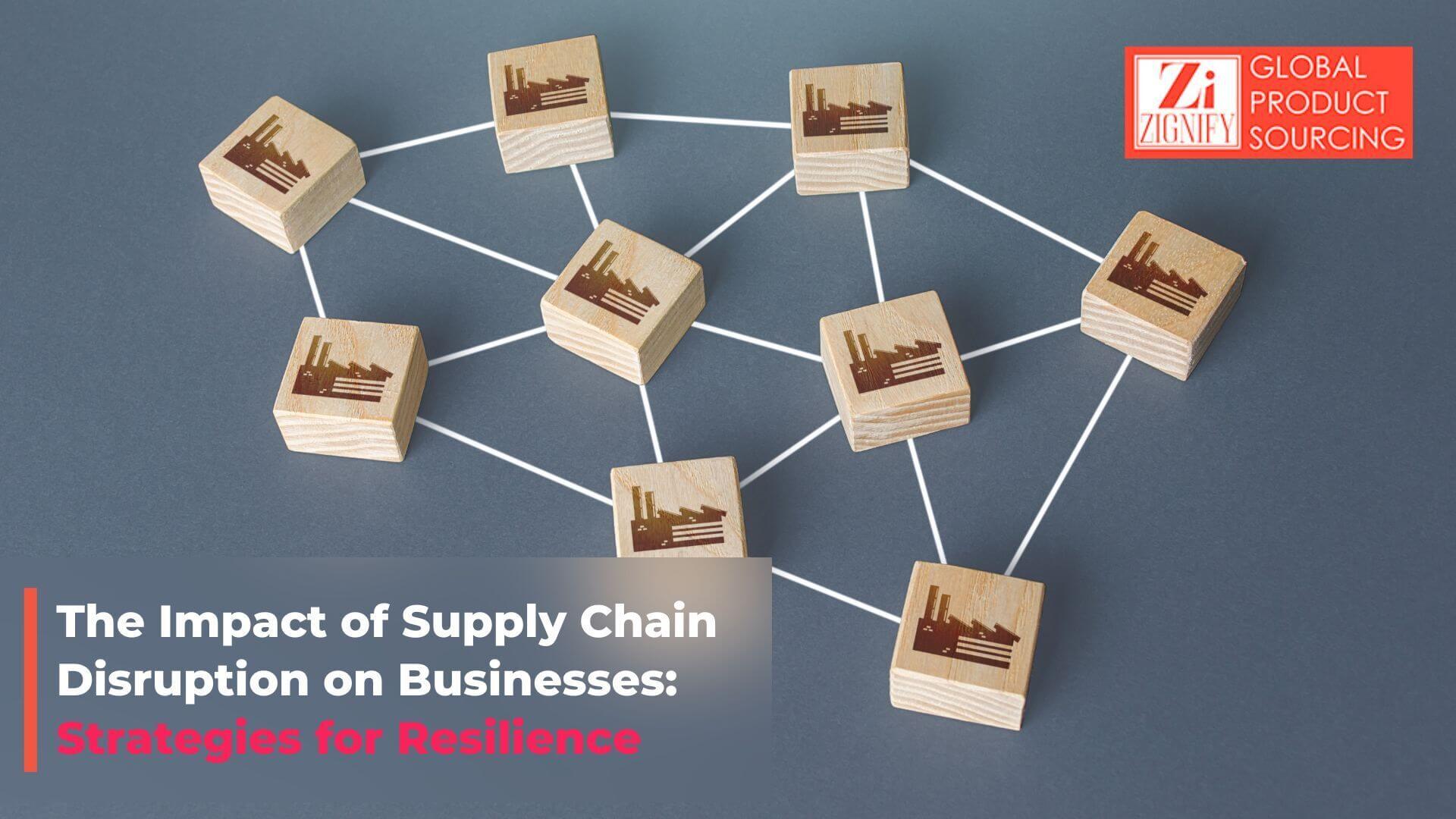
In an increasingly interconnected global economy, businesses are continually navigating a landscape filled with supply chain challenges. From natural disasters to geopolitical tensions and, most recently, the pandemic, supply chain disruptions have become a critical concern for enterprises of all sizes.
With reports from SAP, stating that disruptions to supply chain operations are set to stay in 2023, we believe it’s high time businesses make their supply chain more resilient to weather the storms ahead.
In this article, we’ll delve into the impact of global supply chain disruption on businesses, and explore strategies that companies can use to mitigate these challenges and build resilience.
Key Impacts of Supply Chain Disruption on Businesses
- Financial ConsequencesEscalating Costs: Supply chain disruptions often lead to increased production costs. As a matter of fact, recent research reveals that supply chain disruptions result in a 3-5% increase in expenses and a 7% decrease in sales. Businesses may need to source materials from alternative suppliers at higher prices, invest in expedited shipping, or temporarily halt production. These extra expenses can erode profit margins.Revenue Loss: Delays in delivering products to customers can result in lost sales and revenue. Dissatisfied customers may also seek alternatives, impacting future sales.
- Customer Satisfaction and ReputationCustomer Dissatisfaction: Supply chain disruptions can cause delays in product availability and delivery. Customers who experience delays or receive damaged goods may become dissatisfied, leading to a decline in customer loyalty. This can lead to lost customers and market share.Brand Reputation: Negative customer experiences due to supply chain disruptions can harm a company’s brand reputation. It takes time and effort to rebuild trust once it’s been compromised.
- Inventory ChallengesExcess Inventory: On the flip side, businesses may accumulate excess inventory if they overcompensate for potential disruptions by stockpiling goods. This can tie up capital and storage space.Inventory Shortages: Conversely, supply chain disruptions can lead to shortages, resulting in unmet customer demand and missed sales opportunities.
- Supply Chain ComplexitySupply Chain Complexity: Disruptions can expose weaknesses in a supply chain’s complexity and lack of transparency. Simplifying and optimizing the supply chain can help businesses become more agile and responsive to disruptions.
- Legal and Regulatory IssuesContractual Obligations: Supply chain disruptions can trigger contractual issues, especially when contracts stipulate delivery times and penalties for delays.Regulatory Compliance: Changes in regulations and compliance requirements resulting from disruptions can lead to added costs and operational challenges.
- Employee Morale and ProductivityEmployee Morale: Supply chain disruptions can create uncertainty within the workforce, impacting employee morale. Concerns about job stability and workloads may affect productivity and retention.Operational Disruptions: When supply chains are disrupted, employees often need to adapt quickly to changing circumstances, which can be disruptive and stressful.
- Compliance issuesBusinesses may also face compliance issues if they are unable to meet regulatory requirements due to supply chain disruptions. This can lead to fines and other penalties.
How can Businesses Mitigate the Impact of Supply Chain Disruption?
There are a number of steps that businesses can take to mitigate the impact of supply chain disruption. These steps include:
Proactive Risk Mitigation
Implementing a robust supply chain risk management plan is essential. Diversifying suppliers, establishing backup production facilities, and investing in technology for real-time monitoring are key steps toward resilience.
Enhance Supply Chain Transparency
Enhanced visibility through technologies like blockchain and IoT can provide businesses with the insights needed to identify and address disruptions promptly. Transparency builds trust among stakeholders.
Communicating with customers
Businesses should communicate with their customers openly and honestly about any supply chain disruptions that may impact their ability to deliver products or services. This will help to manage expectations and build trust.
Diversify Suppliers
Relying on a single supplier or a limited number of suppliers can be risky. Diversifying your supplier base reduces vulnerability. If one supplier faces a disruption, you can pivot to alternative sources, ensuring a more consistent supply of materials or goods.
Contingency Planning
Conduct comprehensive risk assessments to identify vulnerabilities in your supply chain. Develop contingency plans that outline steps to take when disruptions occur. Regularly update and test these plans to ensure they remain effective.
Building Strong Supplier Relationships
Nurturing strong relationships with suppliers fosters open communication. This can be invaluable during disruptions, as suppliers are more likely to prioritize your needs and collaborate on solutions when there’s a trusted partnership.
Maintain Safety Stock
Having a safety stock or buffer inventory can help bridge the gap during disruptions. This extra inventory can serve as a temporary supply source until normal operations resume.
Embrace Lean Inventory Management
While maintaining safety stock is essential, businesses should also adopt lean inventory management practices. This means optimizing inventory levels to minimize waste and reduce carrying costs without compromising resilience.
Assess and Redesign Your Supply Chain
Regularly assess your supply chain’s structure and performance. Be willing to redesign it for greater flexibility and agility. Consider local sourcing, nearshoring, or reshoring to reduce dependence on distant suppliers.
Leverage Technology and Data Analytics
Utilize advanced technologies like predictive analytics and AI to forecast potential disruptions and identify areas for improvement in your supply chain. These insights can guide decision-making and risk mitigation strategies.
Collaborate with Industry Peers
Collaboration within industry networks and trade associations can provide valuable insights and support during disruptions. Sharing best practices and experiences can help businesses collectively build resilience.
Continuous Improvement and Adaptability
Supply chain resilience is an ongoing effort. Continuously assess and adapt your strategies in response to new challenges and changes in your business environment.
Cross-Train Employees
Cross-train your employees to handle various roles within your supply chain. This ensures that if a disruption affects key personnel, others can step in to maintain essential operations.
Monitor Geopolitical Developments
Stay informed about geopolitical events and trade policies that could affect your supply chain. Being proactive and adapting to changes can help you navigate potential disruptions more effectively.
In conclusion, while supply chain disruptions are inevitable, they need not be debilitating. Businesses that prioritize resilience through diversification, visibility, and proactive planning are better equipped to minimize the impact of disruptions and emerge stronger in the face of adversity. By implementing these strategies, companies can build robust supply chains that enable sustainable success, even in uncertain times.
Need Help Protecting Your Business from Supply Chain Disruptions? We can help!
For businesses seeking to enhance their supply chain resilience, partnering with Zignify Global Product Sourcing can be a game-changer. We specialize in identifying and securing reliable suppliers across the globe, ensuring a diversified and robust supply chain network.
Our team leverages extensive industry experience and cutting-edge technology to provide real-time visibility into your supply chain, allowing you to proactively address potential disruptions. With a strong emphasis on building and nurturing supplier relationships, we prioritize open communication and collaboration, ensuring you have a network you can rely on during challenging times.
We are committed to helping businesses thrive by optimizing their supply chains, reducing risks, and enhancing overall operational efficiency. Let us be your partner in building a resilient and agile supply chain that adds value and security to your business operations, ultimately adding value to your business in an ever-changing marketplace.




